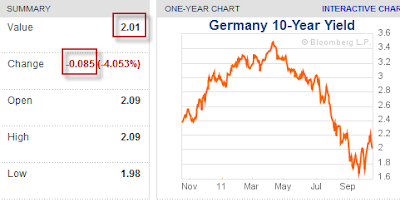Courtesy of Mish
Amidst all the conniving to make the EFSF bazooka credible, the bond market has cast its vote already.
Germany 10-Year Government Bond Yield
France 10-Year Government Bond Yield
Italy 10-Year Government Bond Yield
Interest Rate Comparison
Germany 2.01%
France 3.14%
Italy 5.87%
Germany-France Spread 1.13 Percentage Points (a 20 Year record)
Germany-Italy Spread 3.86 Percentage Points (and climbing)
Use of a leveraged EFSF is one of the reasons for the widening spread between Germany and France. See Leveraged Poison; Jackasses Never Give Up; More Fog Rolls In for additional details.
Bailout Campaign Bogs Down, Divisions Flare
Bloomberg reports Euro Leaders’ Crash Crisis Campaign Bogs Down on Divisions Over Timetable
Europe’s options for overcoming the debt crisis narrowed as Germany doused expectations of a breakthrough at this weekend’s summit and central bankers balked at extended bond purchases.
European stocks fell for a second day after German Chancellor Angela Merkel’s office knocked down what it called “dreams” that the Oct. 23 summit will be the last word in taming the crisis. Christian Noyer, head of France’s central bank, ruled out a ramping up of the European Central Bank’s bond-buying program as part of a multi-pronged strategy to shield countries like Italy.
While Group of 20 finance ministers and central bankers pressed European Union leaders to set out a strategy by the end of the week, divisions flared over an emerging plan to avoid a Greek default, bolster banks and curb contagion.
“We’re really in a bind here,” Carl Weinberg, founder and chief economist at High Frequency Economics, said in an interview with Betty Liu on Bloomberg Television’s “In the Loop.” “We have a lot of egos, a lot of national interests, a lot of political considerations, and that’s just hampering us from getting to a solution.”
One and Only Solution Ruled Out
The reason Europe is in a bind is simple: There is no solution (other than a breakup of the Eurozone). Thus the one and only solution is the one and only solution that is ruled out.
Pea Shooter or Bazooka?
The interesting thing about the alleged bazooka play that may trash France’s sovereign debt rating is that the bazooka has the firepower of a pea shooter.
ZeroHedge lays out all the details in The Math Behind The Re-Revised EFSF Reveals A "Pea Shooter" Not A "Bazooka"
Two simple paragraphs highlights the problem nicely.
Italy and Spain together have just under €2.5 trillion worth of general government debt outstanding. Tradable Spanish and Italian sovereign debt alone amounts to €2.1 trillion. Adding Greece, Ireland and Portugal raises general government debt to €3.1 trillion and tradable government debt to €2.6 trillion. Adding Belgium would raise these totals to €3.5 trillion and €2.9 trillion. In the perhaps unlikely case that France would need sovereign debt insurance, targeting the stocks rather than the flows would require taking care of €5.1 trillion of gross sovereign debt or €4.3 trillion of tradable government debt.
These numbers are beyond the size of even the most optimistic estimates of the most audacious of rescue umbrellas.
ZeroHedge goes through additional math using leverage and insurance as well as analysis by Willem Buiter that plainly shows the math does not work and thus the insurance proposal is Dead-on-Arrival.
Dead-on-Arrival (DOA) or Dead-before-Arrival (DBA)?
The "Dead-on-Arrival" theory makes an assumption the German supreme court would let the idea "arrive" in the first place.
Please see Germany’s Top Judge Throws Major Monkey Wrench Into Leveraged EFSF Machinery, Demands New Constitution and Popular Referendum for Further Powers for further discussion.
Adding to that viewpoint, just yesterday Der Spiegel reportedParliamentary Bailout Committee May Be Unconstitutional
Expect the DOA vs. DBA question to be resolved soon.





